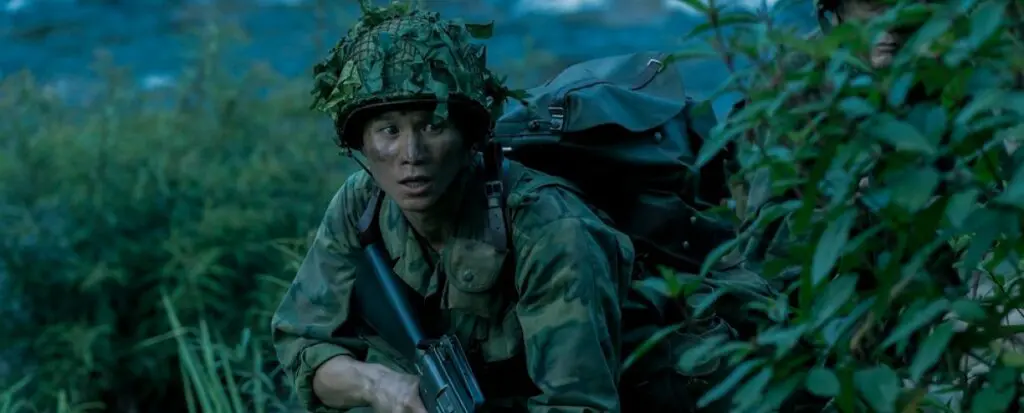Summary
“Endings Are Hard, Aren’t They?” is a masterful finale, recontextualizing much of The Sympathizer in profound ways.
Throughout The Sympathizer, we’ve always known that The Captain would end up back in Vietnam, being interrogated by the people he has spent the entire season spying for. Episode 6 showed us how he got there, as part of the General’s ill-advised mission to retake the country from the Communists. Episode 7, “Endings Are Hard, Aren’t They?, shows us what happens next. And the ending of The Sympathizer, hard or not, is a pretty striking bit of television.
There’s a weirdly alienating quality to this finale. The Captain is from Vietnam, but we haven’t seen him spend much time there, and a lot of the plot has revolved around the slow creep of Westernization. The Captain being suddenly back “home”, and the bulk of the dialogue being in subtitled Vietnamese makes for a weird vibe. We feel as captive as he does.
Claude Offers The Captain A Way Out
The U.S. intelligence apparatus isn’t exactly known for doing people solids. But The Captain has an opportunity he probably wishes he took. Claude offers him a drink containing a substance that’ll make him sick for two days. It’s a way out. He can swerve the General’s suicide mission, and thus being captured when it inevitably fails.
It’s tough to say why Claude is doing this. Sentimentality, maybe. But it’s more likely because he doesn’t want the Captain spilling what he has learned under interrogation. Claude discovered that the Captain was a double agent because Sonny’s apartment was bugged, which means the Captain was operating under his nose for a while. Still, he doesn’t seem all that surprised – or even upset – to discover what the Captain was really up to.
Re-education
Predictably, the Captain and Bon are captured. Everyone else is killed. But they’re not to think of themselves as prisoners, per se, but as guests being politely re-educated in the ways of Vietnamese Communism.
But what is there to learn? The Captain was already becoming disillusioned with his mission before he returned to Vietnam. He has come back to a country he doesn’t recognize, to tell and retell a story that the Commandant edits as he goes. The truth is what you – or someone else – makes it. The Captain has attached himself to a cause that is indifferent to his truth, or anyone else’s.
It’s a big statement to say everything was a waste of time. But it was, really.
Man to Man
While in the flash-forwards we have only seen the Captain interacting with the Commandant, as it turns out he’s answerable to someone else – the Captain’s old buddy Man, who is now the North Vietnamese Commissar and spends all his time wearing a white hood with a single eye hole cut in it because during the Day of Liberation he was barbecued in napalm.
Man’s fate is significant to the Captain because he’s most emblematic of how the homeland has changed. That once prim and proper officer is now a wreck, a morphine-addicted mass of scar tissue whose visage has to be hidden so it doesn’t undermine the message he’s espousing.
Robert Downey Jr. Is White Authority
Initially, the casting of Robert Downey Jr. in multiple roles felt like a flex, a showy attempt to make his prestige TV debut a big deal. But the ending of The Sympathizer reveals this choice to be a work of sneaky genius.
Needless to say, the only revelations the Captain comes to under days of torture are about himself. One of them is a repressed memory of his mother being raped by a French priest who looks like – all together now – Robert Downey Jr. The Captain’s bubbling resentment for this guy became the lens through which he viewed every white, Western authority figure he came across, from CIA spooks to U.S. senators to hoity-toity professors and auteur filmmakers.
They’re all Robert Downey Jr. because they are, to the Captain, functionally the same person – reflections of a regime that crushes everything in its path that doesn’t look or think the same way. And so we return to the Coca-Cola bottle.
Coca-Cola Is Bad For You
The humble bottle of Coke had cropped up a few times as a recurring motif of Americana, but again, The Sympathizer Episode 7 lends a deeper, darker meaning to it.
At one point, Man shows the Captain the completed movie that Niko made. It is, by American standards, quite progressive – Niko tried to honor his promise. But with the additional context of what happened to the Captain’s mother, we know why he flipped out about the rape scene. This revelation leads to another – that he has hidden, from himself and his interrogators, what happened to the North Vietnamese spy who was tormented on a theatre stage in the premiere episode.
She was sexually assaulted – with a bottle of Coca-Cola. The Captain imagines the scenario differently each time; him heroically attempting to intervene (which he doesn’t), and the Coca-Cola bottle being forced into her mouth. He has created less violating interpretations of the event that he can square more easily with his conscience.
She never sold him out. She believed in the cause, like he did. It hardly seems worth it in the end.
The Ghosts Of Who We Were
At no point does the Captain ever recognize the Vietnam he loved. The sets of Niko’s film bore a closer resemblance to the homeland of his childhood, even as fraught with difficulty as it was then.
He never recognizes himself, either. He thought his cause was just and his story was true, but neither of those things is the reality. His cause was nothing because nothing is what remains on the other side of a failed fight. The people, the values, the culture, they’re lost. The fight is over.
With Man’s help, the Captain and Bon escape to a boat with many other families, and the boat presumably takes them away from Vietnam, hopefully to safety. The tension between the Captain and Bon, the hidden fact that the Captain has been a communist spy the whole time, doesn’t matter – Bon says outright that it doesn’t, since all that matters is that they’re friends. There have been enough confessions.
As the Captain sails away, he looks back to shore and sees it packed with the ghosts of the Vietnamese people killed in the war. They’re not there, not really. All that remains is as Man said – nothing. It was a hard lesson to learn, and it could only be learned in the hardest of ways. But the Captain got there in the end.




